“LACHES: I take courage to be a certain endurance present in one’s character, if I have to mention the element essentially present in all cases.
SOCRATES: Now, this is how it appears to me: by no means every kind of endurance, I think, can appear to you to be bravery. So endurance accompanied by wisdom would be both fine and good, wouldn’t it?
LACHES: Certainly.
SOCRATES: But what of it when accompanied by foolishness? Surely it’s quite the opposite, damaging and detrimental?
LACHES: Yes.
SOCRATES: So, according to your account, wise endurance will be bravery.
LACHES: So it seems.
SOCRATES: Let’s see now: wise, but wise in what respect? Perhaps in every respect, great or small? Suppose, for instance, someone showed endurance in spending his money wisely, because he realized that if he spent it, he’d make a profit: would you call him brave?
LACHES: Good heavens, I certainly wouldn’t!
SOCRATES: Well then, suppose during a war a man showed endurance by being prepared to fight: he has calculated his chances wisely and realized that others will support him, and that he’ll be fighting an enemy outnumbered and outclassed by his own side, and that he has the stronger position – now, which would you say is the braver, the man showing endurance with the benefit of this kind of wisdom and these resources, or a man from the opposing camp willing to show endurance in standing against him?
LACHES: I’d say the man in the opposing camp, Socrates.
SOCRATES: But surely his endurance is more foolish than that of the other?
LACHES: Yes, you’re right.
SOCRATES: Now, we’ve previously shown that without knowledge endurance and daring are disgraceful and damaging, haven’t we?
LACHES: Certainly.
SOCRATES: But now we’re claiming, on the contrary, that this disgraceful thing, endurance without knowledge, is bravery.
LACHES: Apparently so.
SOCRATES: Then do you think we’ve given a good account?
LACHES: Good heavens, Socrates, I certainly don’t. I’m not prepared to give up too soon, Socrates. I’m really annoyed because I can’t find the words to say what I’m thinking – I’m sure I can see what Bravery is, but somehow or other she has escaped me for the moment, so I can’t find the words to catch her and actually say what she is!
SOCRATES: Then do you mind if we invite Nicias here to join the hunt? He may be more resourceful than we are.
LACHES: Of course I don’t mind.
SOCRATES: Come on then, Nicias, your friends are floundering in a sea of words! We’ve got ourselves hopelessly confused, so you’d better give us some help, if there’s anything you can do. The hopelessness of our predicament is obvious; but if you tell us what you think bravery is, you’ll get us out of this hopeless state, and you’ll also confirm your own thoughts by putting them into words.”
(Laches, 192c-194c)


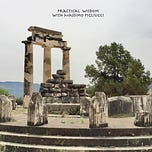






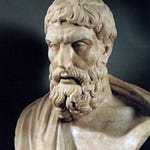
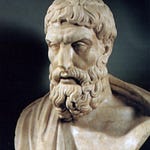
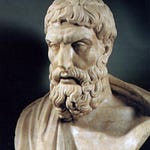
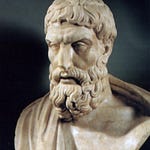
Share this post